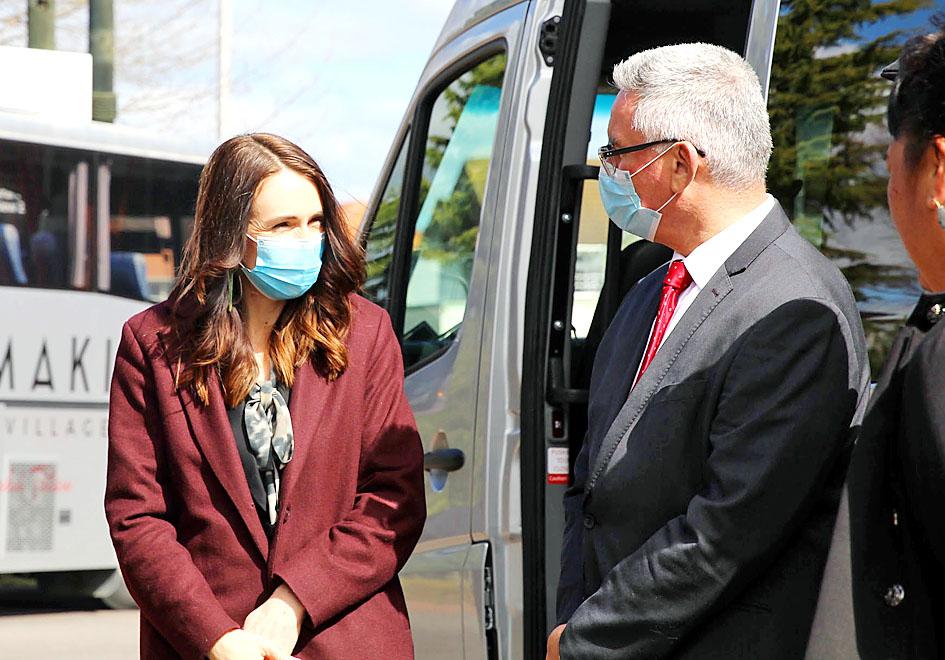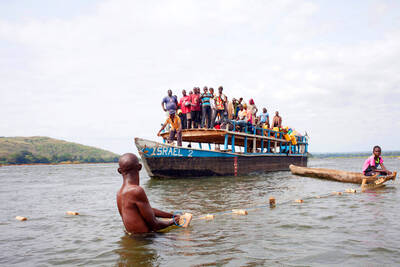New Zealand Prime Minister Jacinda Ardern yesterday resumed campaigning for the nation’s delayed general election with an attention-grabbing promise to make the Maori New Year a public holiday.
Electioneering had barely started last month when a sudden COVID-19 outbreak forced Auckland into lockdown and brought a temporary halt to campaign activities.
Ardern ended up delaying the election by four weeks to Oct. 17 so her government could focus on containing the Auckland infections, which ended 102 days without community transmission of COVID-19 in New Zealand.

Photo: EPA-EFE
With lockdown now over in the nation’s largest city, Ardern kick-started her Labour Party’s renewed campaign with a pledge to make Matariki, the Maori new year, a public holiday from 2022.
“As I’ve traveled around New Zealand I’ve heard the calls for Matariki to become a public holiday — its time has come,” she said.
Labour deputy leader Kelvin Davis, who has a Maori background, said a Matariki holiday sent an important message to New Zealand’s indigenous people, who comprise less than 20 percent of the country’s population, but are central to its national identity.
“Making Matariki a public holiday is another step forward in our partnership as a people and a further recognition of te ao Maori [the Maori worldview] in our public life,” he said.
Ardern said Matariki — which usually falls in July — would help stimulate the economy by driving up spending.
“We don’t have many statutory holidays compared to other OECD [Organisation for Economic Co-operation and Development] countries and it would be good to break up the long run through winter,” she said.
However, National Party eader Judith Collins said Ardern’s priority should be on creating jobs to ease the economic crisis caused by the pandemic, not announcing new holidays.

‘IN A DIFFERENT PLACE’: The envoy first visited Shanghai, where he attended a Chinese basketball playoff match, and is to meet top officials in Beijing tomorrow US Secretary of State Antony Blinken yesterday arrived in China on his second visit in a year as the US ramps up pressure on its rival over its support for Russia while also seeking to manage tensions with Beijing. The US diplomat tomorrow is to meet China’s top brass in Beijing, where he is also expected to plead for restraint as Taiwan inaugurates president-elect William Lai (賴清德), and to raise US concerns on Chinese trade practices. However, Blinken is also seeking to stabilize ties, with tensions between the world’s two largest economies easing since his previous visit in June last year. At the

UNSETTLING IMAGES: The scene took place in front of TV crews covering the Trump trial, with a CNN anchor calling it an ‘emotional and unbelievably disturbing moment’ A man who doused himself in an accelerant and set himself on fire outside the courthouse where former US president Donald Trump is on trial has died, police said yesterday. The New York City Police Department (NYPD) said the man was declared dead by staff at an area hospital. The man was in Collect Pond Park at about 1:30pm on Friday when he took out pamphlets espousing conspiracy theories, tossed them around, then doused himself in an accelerant and set himself on fire, officials and witnesses said. A large number of police officers were nearby when it happened. Some officers and bystanders rushed

Beijing is continuing to commit genocide and crimes against humanity against Uyghurs and other Muslim minorities in its western Xinjiang province, U.S. Secretary of State Antony Blinken said in a report published on Monday, ahead of his planned visit to China this week. The State Department’s annual human rights report, which documents abuses recorded all over the world during the previous calendar year, repeated language from previous years on the treatment of Muslims in Xinjiang, but the publication raises the issue ahead of delicate talks, including on the war in Ukraine and global trade, between the top U.S. diplomat and Chinese

RIVER TRAGEDY: Local fishers and residents helped rescue people after the vessel capsized, while motorbike taxis evacuated some of the injured At least 58 people going to a funeral died after their overloaded river boat capsized in the Central African Republic’s (CAR) capital, Bangui, the head of civil protection said on Saturday. “We were able to extract 58 lifeless bodies,” Thomas Djimasse told Radio Guira. “We don’t know the total number of people who are underwater. According to witnesses and videos on social media, the wooden boat was carrying more than 300 people — some standing and others perched on wooden structures — when it sank on the Mpoko River on Friday. The vessel was heading to the funeral of a village chief in